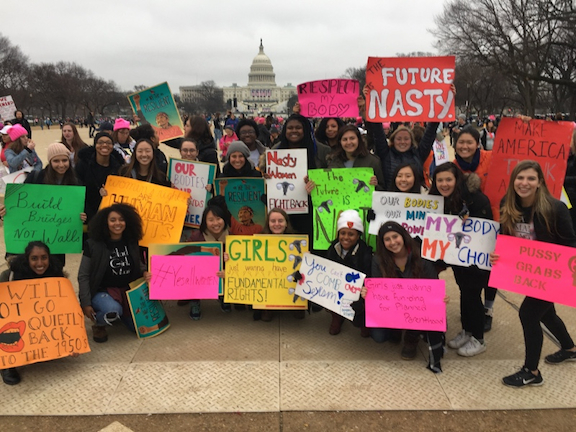

A group of students traveled from Amherst to Washington D.C. on Saturday, Jan. 21 in a trip organized by student activist group Reproductive Justice Alliance to participate in the Women’s March on Washington, a demonstration against President Donald Trump’s political agenda.
Students marched carrying posters with slogans such as “My Body My Choice,” “Nasty Women Fight Back” and “Build Bridges Not Walls.” Twenty students attended the event, along with Director of the Multicultural Resource Center Bulaong Ramiz and Director of the Women’s and Gender Center Jesse Beal.
According to the event’s website, the Women’s March on Washington was organized in response to “the rhetoric of the past election cycle [that] has insulted, demonized and threatened many of us.” Designed to take place on President Trump’s first day in office, the event’s mission was to “send a bold message to our new government … that women’s rights are human rights. We stand together, recognizing that defending the most marginalized among us is defending all of us.”
Amherst students joined the protest with over half a million other demonstrators, making it one of the biggest marches in the capital’s history, as well as the largest U.S. inaugural protest, according to the Associated Press. Additionally, over half a million more protestors participated in sister marches across the country in New York, Chicago, Philadelphia, Boston and Los Angeles.
“It was great to be surrounded by so many people who share my sentiments about the election,” Rachel Cohen ’19 said in an online interview. “The energy really made me ready to roll my sleeves up and get to work.”
“Seeing the thousands of people in D.C. turn out to support women was inspiring and motivating,” Kyra Raines ’20 said in an online interview. She noted that some of the march protesters “definitely represented white feminist ideas,” but that the event speakers and organizers emphasized more intersectional issues. “Overall, it was meaningful to see so many people there and so many amazing women in one place.”
The Reproductive Justice Alliance, led by Samantha O’Brien ’18 and Kamini Ramlakhan ’17, coordinated with Beal in order to secure funding for the trip, provide vans for transportation and communicate with a D.C. Unitarian church which offered to house the students overnight for free.
O’Brien and Ramlakhan worked to make the trip free and accessible for students and gathered a diverse group to attend the march.
“Our end of it was a lot of connecting with students [and having] representation from different affinity groups on campus in order to really broaden the idea of what a women’s march should look like,” O’Brien said. “So, not limited to white women, and not limited to cisgender, straight women or high-income women … Historically, women’s marches have had that kind of association.”
O’Brien said that she and other WGC student staff members started thinking about creating the Reproductive Justice Alliance after Trump’s election victory last November. “We wanted to be able to do things … not as paid employees of the college, so we could do more activist things and not be working within the constraints of the administration,” O’Brien said.
Although the club is not yet an official registered student organization, the organizers hope to use the trip to the Women’s March as a launching point. In the future, the club plans to hold reproductive rights awareness events and partner with local abortion clinics and Planned Parenthood.
The trip to the Women’s March was one of several student-organized events in response to Trump’s election, including a student walk-out on Nov. 16. The walk-out, which received outside media attention, urged the college to declare itself a “sanctuary campus” for students who are undocumented or part of the Deferred Action for Childhood Arrivals program. DACA, a federal policy created in 2012, calls for deferred legal action for some undocumented people who came to the U.S. as young children.